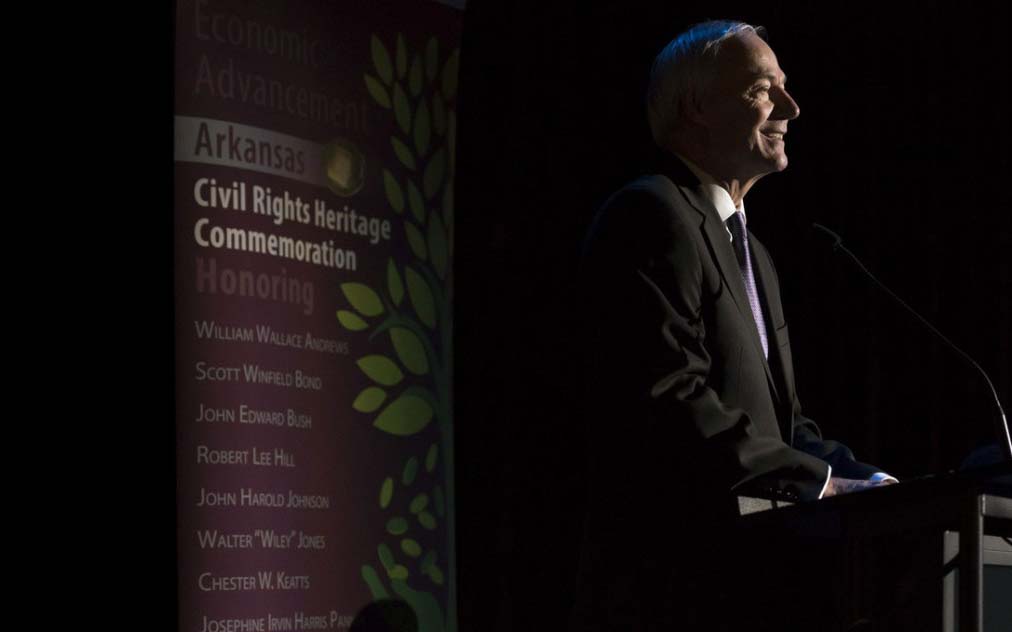Civil Rights Heritage Trail honorees remembered
February 13-19, 2017
By Angelita Faller
Angela Walker fondly remembers her grandfather, William “Sonny” Walker, was her family’s “personal hero.”
“He was a great man,” said Angela Walker, an early childhood education master’s student at the University of Arkansas at Little Rock. “He was always a gentleman you could talk to about anything. He made a big impact on our community.”
Sonny Walker, former head of the Arkansas Office of Economic Opportunity, was one of 10 people whose names were added to the Arkansas Civil Rights Heritage Trail Feb. 1 near the Ron Robinson Theater in downtown Little Rock.
Established in the summer of 2011, the Civil Rights Heritage Trail honors those who made significant contributions to civil rights in Arkansas. The trail raises public awareness of the long and rich legacy of Arkansas’s civil rights history. This year’s event recognized African Americans who made great strides in economic advancement.
“In times when African Americans were often treated as second-class citizens and faced many obstacles, economic advancement was in itself a defiant protest against white supremacy and a refusal against the odds to surrender to pervasive racial discrimination,” said John Kirk, director of the UA Little Rock Anderson Institute on Race and Ethnicity.
Gov. Asa Hutchinson stated that the fight for Civil Rights is not something that belongs solely to previous generations.
“It is a battle each generation must engage in,” Hutchinson said. “Emphasizing the importance of our Civil Rights history is important for each generation of Arkansans.”
The ceremony brought mixed emotions for Angela Walker. Her grandfather would have been proud to receive such an honor, but she was sad he could not attend the ceremony himself. He passed away June 14, 2016.
“He would have loved this,” she said. “He deserved it, but he was a very humble man.”
A Pine Bluff native and UA Little Rock alumnus, Sonny Walker became the first African American to head a state economic opportunity office in the South, a position that Gov. Winthrop Rockefeller appointed him to in 1969. Walker also became the first African American cabinet member of a southern governor.
Walker moved to Atlanta in 1972 when President Richard Nixon appointed him regional director of the Office of Economic Opportunity. He later served as director and chief operating officer for the Martin Luther King Center for Nonviolent Social Change and as a speechwriter for King’s widow Coretta Scott King.
John Kirk, director of the Anderson Institute on Race and Ethnicity, announced 10 names to be added to the Arkansas Civil Rights Heritage Trail during a program at the Ron Robinson Theater on Feb. 1. Photo by Lonnie Timmons III.
During the Feb. 1 event, a 12-inch bronze marker was placed on the trail for each honoree. The trail begins in front of the Old State House Convention Center on Markham Street and will eventually extend to the William J. Clinton Presidential Center and Park and other points throughout the downtown corridor.
The markers for this year’s honorees were installed at the corner of LaHarpe Boulevard and President Clinton Avenue. During the ceremony, the Dunbar Magnet Middle School Singers, Tonya Leeks, and David Ashley performed live music from the Civil Rights era.
The event was held in partnership with the Anderson Institute on Race and Ethnicity, the Butler Center for Arkansas Studies, and the Clinton School of Public Service.
Other 2017 honorees include:
• William Wallace Andrews, a prominent African American leader and entrepreneur in Little Rock before and after the Civil War
• Scott Winfield Bond, a successful landowner, farmer and businessman in the Arkansas Delta and one of Arkansas’s wealthiest African Americans during the period before the New Deal in the 1930s
• John Edward Bush, co-founder of the Mosaic Templars of America, a fraternal organization that expanded to 26 states and six foreign countries between the 1880s and 1930s. He was also chair of the Arkansas Republican Party.
• Robert Lee Hill, founder of the Progressive Farmers and Household Union of America, which organized in the Arkansas Delta to gain fair wages for sharecroppers after World War I
• John Harold Johnson, who built the largest African American publishing company in the world, producing titles such as Ebony and Jet magazines
• Walter “Wiley” Jones, one of the wealthiest African Americans in the South from his various business endeavors in late 19th century Pine Bluff
• Chester W. Keatts, co-founder of the Mosaic Templars of America, a fraternal organization that expanded to 26 states and six foreign countries between the 1880s and 1930s
• Josephine Irvin Harris Pankey, a successful real estate developer who accumulated large tracts of land in West Little Rock during the age of segregation
• Sue Cowan Williams, an English teacher at Dunbar High School who successfully sued the school district for equal pay with white teachers during the 1940s
For more details, please contact the Anderson Institute at 569-8932 or race-ethnicity@ualr.edu.
PHOTO CAPTION:
Governor Asa Hutchinson gives the introduction to the induction ceremony for the 2017 Arkansas Civil Rights Heritage Trail honorees. (Photo by Lonnie Timmons III)



